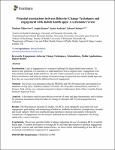Potential associations between behavior change techniques and engagement with mobile health apps: a systematic review
| dc.contributor.author | Milne-Ives, M | |
| dc.contributor.author | Homer, SR | |
| dc.contributor.author | Andrade, J | |
| dc.contributor.author | Meinert, E | |
| dc.date.accessioned | 2023-11-15T15:58:24Z | |
| dc.date.available | 2023-11-15T15:58:24Z | |
| dc.date.issued | 2023-09-18 | |
| dc.identifier.issn | 1664-1078 | |
| dc.identifier.issn | 1664-1078 | |
| dc.identifier.other | 1227443 | |
| dc.identifier.uri | https://pearl.plymouth.ac.uk/handle/10026.1/21648 | |
| dc.description.abstract |
<jats:sec><jats:title>Introduction</jats:title><jats:p>Lack of engagement is a common challenge for digital health interventions. To achieve their potential, it is necessary to understand how best to support users’ engagement with interventions and target health behaviors. The aim of this systematic review was to identify the behavioral theories and behavior change techniques being incorporated into mobile health apps and how they are associated with the different components of engagement.</jats:p></jats:sec><jats:sec><jats:title>Methods</jats:title><jats:p>The review was structured using the PRISMA and PICOS frameworks and searched six databases in July 2022: PubMed, Embase, CINAHL, APA PsycArticles, ScienceDirect, and Web of Science. Risk of bias was evaluated using the Cochrane Collaboration Risk of Bias 2 and the Mixed Methods Appraisal Tools.</jats:p></jats:sec><jats:sec><jats:title>Analysis</jats:title><jats:p>A descriptive analysis provided an overview of study and app characteristics and evidence for potential associations between Behavior Change Techniques (BCTs) and engagement was examined.</jats:p></jats:sec><jats:sec><jats:title>Results</jats:title><jats:p>The final analysis included 28 studies. Six BCTs were repeatedly associated with user engagement: goal setting, self-monitoring of behavior, feedback on behavior, prompts/cues, rewards, and social support. There was insufficient data reported to examine associations with specific components of engagement, but the analysis indicated that the different components were being captured by various measures.</jats:p></jats:sec><jats:sec><jats:title>Conclusion</jats:title><jats:p>This review provides further evidence supporting the use of common BCTs in mobile health apps. To enable developers to leverage BCTs and other app features to optimize engagement in specific contexts and individual characteristics, we need a better understanding of how BCTs are associated with different components of engagement.</jats:p></jats:sec><jats:sec><jats:title>Systematic review registration</jats:title><jats:p><jats:ext-link>https://www.crd.york.ac.uk/prospero/</jats:ext-link>, identifier CRD42022312596.</jats:p></jats:sec> | |
| dc.format.extent | 1227443- | |
| dc.format.medium | Electronic-eCollection | |
| dc.language | eng | |
| dc.publisher | Frontiers Media | |
| dc.subject | engagement | |
| dc.subject | behaviour change techniques | |
| dc.subject | telemedicine | |
| dc.subject | mobile applications | |
| dc.subject | digital health | |
| dc.title | Potential associations between behavior change techniques and engagement with mobile health apps: a systematic review | |
| dc.type | journal-article | |
| dc.type | Review | |
| plymouth.author-url | https://www.ncbi.nlm.nih.gov/pubmed/37794916 | |
| plymouth.volume | 14 | |
| plymouth.publisher-url | http://dx.doi.org/10.3389/fpsyg.2023.1227443 | |
| plymouth.publication-status | Published online | |
| plymouth.journal | Frontiers in Psychology | |
| dc.identifier.doi | 10.3389/fpsyg.2023.1227443 | |
| plymouth.organisational-group | |Plymouth | |
| plymouth.organisational-group | |Plymouth|Research Groups | |
| plymouth.organisational-group | |Plymouth|Research Groups|Centre for Brain, Cognition and Behaviour (CBCB) | |
| plymouth.organisational-group | |Plymouth|Research Groups|Centre for Brain, Cognition and Behaviour (CBCB)|Cognition | |
| plymouth.organisational-group | |Plymouth|Faculty of Health | |
| plymouth.organisational-group | |Plymouth|Faculty of Health|School of Psychology | |
| plymouth.organisational-group | |Plymouth|Research Groups|Institute of Health and Community | |
| plymouth.organisational-group | |Plymouth|REF 2021 Researchers by UoA | |
| plymouth.organisational-group | |Plymouth|Users by role | |
| plymouth.organisational-group | |Plymouth|Users by role|Academics | |
| plymouth.organisational-group | |Plymouth|REF 2021 Researchers by UoA|UoA04 Psychology, Psychiatry and Neuroscience | |
| plymouth.organisational-group | |Plymouth|REF 2021 Researchers by UoA|UoA04 Psychology, Psychiatry and Neuroscience|UoA04 REF peer reviewers | |
| plymouth.organisational-group | |Plymouth|Admin Group - REF | |
| plymouth.organisational-group | |Plymouth|Admin Group - REF|REF Admin Group - FoH | |
| plymouth.organisational-group | |Plymouth|REF 2021 Researchers by UoA|UoA04 Psychology, Psychiatry and Neuroscience|UoA04 Psychology, Psychiatry and Neuroscience MANUAL | |
| plymouth.organisational-group | |Plymouth|Research Groups|Plymouth Institute of Health and Care Research (PIHR) | |
| plymouth.organisational-group | |Plymouth|REF 2028 Researchers by UoA | |
| plymouth.organisational-group | |Plymouth|REF 2028 Researchers by UoA|UoA04 Psychology, Psychiatry and Neuroscience | |
| dc.publisher.place | Switzerland | |
| dcterms.dateAccepted | 2023-09-04 | |
| dc.date.updated | 2023-11-15T15:58:23Z | |
| dc.rights.embargodate | 2023-11-17 | |
| dc.identifier.eissn | 1664-1078 | |
| rioxxterms.versionofrecord | 10.3389/fpsyg.2023.1227443 |


